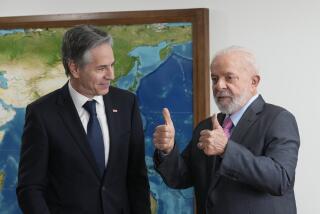Brazil Is Busting Out All Over : Future Has Caught Up With It, and U.S. Must Act Accordingly
- Share via
Lost in the shuffle--likely to be ignored in the press of news about terrorism, superpower summitry and our many local concerns--the first civilian president of Brazil in a generation, Jose Sarney, is visiting Washington.
For years it has been a commonplace that Brazil is “the country of the future--and it always will be.” This dismissal of the world’s fifth-largest nation is unfortunate. The future has caught up with Brazil, and the consequences will make who governs in Brasilia--and how--ultimately a more important matter for this hemisphere than who rules in Managua or San Salvador.
Few nations have grown so much, so quickly and on such a grand scale as has Brazil in the past 25 years. Its population has nearly doubled, to 135 million; nine of its cities have a population of more than 1 million--including Sao Paulo, a megalopolis of restless dynamism with an estimated 14 million inhabitants.
Brazil’s economy has been transformed. Within one generation Brazil has changed from an importer to an exporter of steel, heavy machinery, petrochemicals, weapons and other industrial products. Twenty-five years ago more than half of Brazil’s export earnings were from coffee; by the mid-1980s coffee accounts for less than 10% of Brazil’s export earnings--less than from automobiles and auto parts. Brazil is now second only to South Korea as the largest exporter among developing countries, and second only to the United States in agricultural exports.
Brazil’s natural resources are legion. Its reserves of iron ore are the world’s largest, as is its hydroelectric potential. Mineral riches--uranium, bauxite, manganese, copper, iron, gold and now even petroleum--are still being discovered in important quantities. And Brazil produces as much steel as does Great Britain, the original industrial power.
Brazil is also among the world’s major exporters of weapons. It sells aircraft, tanks, missiles, armored personnel carriers and similar items worth well over $1 billion a year to more than 30 countries. Brazilian-made airplanes fly many commuter routes in the United States and are used in more than 20 other nations. Brazilian-made engines run many U.S.-built cars. Brazilian computers are used in China. Brazilian engineers and contractors undertake major projects elsewhere in Latin America, Africa and the Middle East.
Brazil is already a significant force in various other aspects of international affairs. As the developing world’s largest borrower, with $100 billion in outstanding loans, Brazil obviously affects the global financial system. As one of the Third World’s main importers and exporters, Brazil is important in international commerce. Brazil’s large, professionally skilled diplomatic corps is increasingly influential.
Yet even as Brazil’s stature has grown in the world community, so has the magnitude of its problems at home.
A depression worse than any since the 1930s wracked Brazil in the early part of this decade, driving down real income and employment. The impressive recovery experienced since 1984 has left millions of Brazilians untouched by its benefits. The country’s overwhelming debt burden has meant that resources needed to fuel continued expansion of the economy have been siphoned abroad to commercial banks. The depression, compounded by austerity programs introduced to save foreign exchange, has meant poverty of critical dimensions: Millions are suffering from malnutrition and epidemics of the diseases of deprivation, and in every city children by the thousands live on the streets. Brazil has increasingly had to face the stark reality of two nations living side by side within its borders--one modern and dynamic, the other poor and backward.
This is what confronts the first civilian president that Brazil has had in 25 years. Sarney has begun well. In its first year and a half in office his administration has undertaken significant economic reforms to fight inflation, promote economic growth, redistribute land and remedy gross socioeconomic inequities. Sarney’s introduction of a new currency, the cruzado, was an innovative attempt to reverse inflation without inducing renewed recession through strict controls of prices and wages. It had an impressive initial effect, although strains are beginning to show.
Sarney does not come to Washington looking for charity or special favors. What he does seek, for Brazil and for other developing countries, is a more farsighted international economic policy from the United States. He seeks a sustained effort by Washington to help reduce the debt burden on developing countries. He wants stronger U.S. efforts to resist protectionist pressures and to open our markets more fully and consistently to Brazil’s exports.
In short, what Sarney wants from the United States is statesmanlike economic leadership. The hemisphere cannot afford less.
More to Read
Sign up for Essential California
The most important California stories and recommendations in your inbox every morning.
You may occasionally receive promotional content from the Los Angeles Times.












